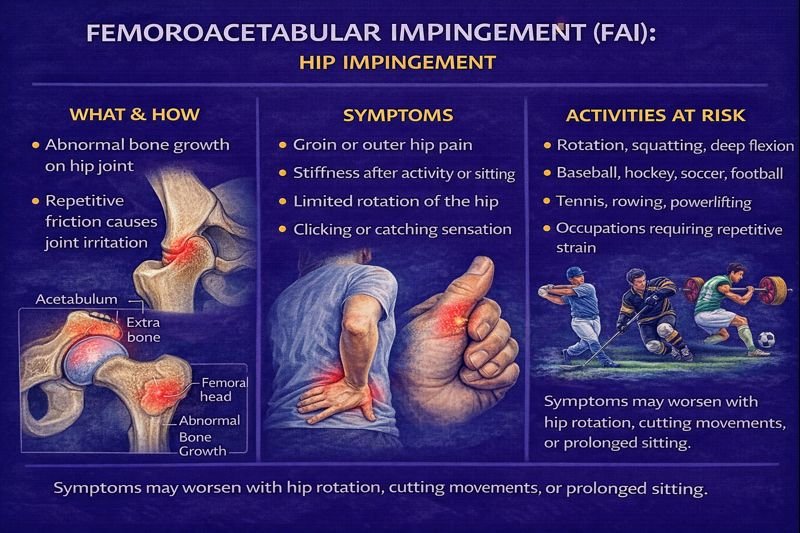Femoroacetabular Impingement (FAI): Hip Impingement Awareness for Sports & Activity (Canada)
 What Is Femoroacetabular Impingement (FAI)?
What Is Femoroacetabular Impingement (FAI)?
Femoroacetabular impingement (FAI), often called hip impingement, refers to abnormal contact between the ball (femoral head) and socket (acetabulum) of the hip joint. Over time, the repeated contact can irritate cartilage and the soft rim of the hip socket known as the labrum.
FAI is more widely recognized in athletic communities today, but many people are unfamiliar with the condition.
Relevance for Sports, First Aid & Active Workplaces
The hip joint plays a major role in rotation, stability, and force transfer. Sports and occupations that involve twisting, deep squatting, or repeated hip flexion may aggravate symptoms. Awareness of hip injuries can help individuals modify tasks, seek assessment, and understand early warning signs.
Scenario: Mild & Realistic
A varsity baseball pitcher noticed hip stiffness and groin discomfort after long tournaments, especially during rotational movements. Their trainer suggested modifying practice volume and referred them to a healthcare professional for assessment. Conditioning adjustments reduced discomfort over the season.
How Hip Impingement Develops
FAI occurs when:
-
Extra bone develops on the femoral head and/or the rim of the socket
-
The additional bone causes pinching during hip rotation or flexion
-
Repeated contact irritates local tissues over time
FAI may begin developing during adolescence as the hips grow. Not everyone with this bone shape develops symptoms; irritation often depends on activity demands.
Who Is More Likely to Experience FAI?
FAI is commonly discussed in sports that involve strong rotational forces, such as:
-
Baseball
-
Hockey
-
Soccer
-
Football
-
Tennis
-
Lacrosse
-
Volleyball
-
Martial arts
-
Rowing
-
Powerlifting (deep squats)
The condition is not limited to athletes—anyone performing repetitive rotational movements or prolonged sitting may notice discomfort.
Symptoms & Early Signals
Common symptoms described by individuals with hip impingement include:
-
Stiffness or discomfort in the groin area
-
Hip or low-back ache after sport or sitting
-
Pain on the outer side of the hip
-
Stiffness when rotating the leg inward
-
Stiffness after long sitting (e.g., car rides, office work)
-
Reduced range of motion during sport
Symptoms may worsen with deep squatting, cutting movements, twisting, or prolonged flexion.
Short-Term Management & First Aid Awareness
General first aid education highlights:
-
Resting from aggravating movements
-
Avoiding repeated rotational loads during symptom flare-ups
-
Modifying sport or work tasks temporarily
-
Consulting a healthcare professional for persistent symptoms
Healthcare professionals may recommend physiotherapy, strength conditioning, movement modifications, or further imaging if required.
Long-Term Considerations
Some individuals require structured rehabilitation or medical management to address strength, mobility, and mechanics. Others may resume activity with training modifications alone. Specialists help determine return-to-sport timelines and longer-term strategies.
Prevention & Risk Reduction
FAI itself cannot always be prevented because bone shape develops during growth. However, aggravation can be reduced by:
-
Cross-training instead of single-sport specialization
-
Reducing repetitive rotational strain
-
Strengthening core and hip stabilizers
-
Avoiding aggressive deep squatting during symptom flare-ups
-
Building gradual sport progression
-
Seeking early assessment for groin or hip stiffness
FAQ — Femoroacetabular Impingement (FAI)
1. Do all people with FAI have symptoms?
No. Many individuals with FAI bone shapes never develop pain or stiffness.
2. Is hip impingement only a sports issue?
No. Prolonged sitting, workplace tasks, or repetitive hobbies can also aggravate symptoms.
3. Why is rotation uncomfortable?
Twisting increases contact between the femoral head and socket, especially during deep flexion.
4. Can teenagers or young adults experience FAI?
Yes. FAI often appears in adolescence or young adulthood when athletic participation is high.
5. Can FAI stop someone from playing sports?
Not necessarily. Many athletes continue or modify participation with guidance from healthcare professionals.
Educational Note
This article supports public awareness of hip impingement, sport considerations, first aid awareness, and prevention strategies. Diagnosis, treatment, and rehabilitation are determined by healthcare professionals.

